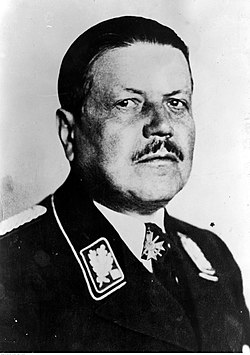Wilhelm Ohnesorge
Wilhelm Ohnesorge | |
|---|---|
 | |
| Reich Postal Minister | |
| In office 2 February 1937 – 30 April 1945 | |
| Chancellor | Adolf Hitler |
| Preceded by | Paul Freiherr von Eltz-Rübenach |
| Succeeded by | Julius Dorpmüller |
| Personal details | |
| Born | Karl Wilhelm Ohnesorge 8 June 1872 Gräfenhainichen, Province of Saxony, German Empire |
| Died | 1 February 1962 (aged 89) Munich, Bavaria, West Germany |
| Nationality | German |
| Political party | Nazi Party |
| Occupation | Postal Manager |
Karl Wilhelm Ohnesorge (8 June 1872 – 1 February 1962) was a German politician in the Third Reich who sat in the Hitler Cabinet. From 1937 to 1945, he was the Reichsminister of the Reich Postal Ministry,[1] the German postal service, having succeeded Paul Freiherr von Eltz-Rübenach. Along with his ministerial duties, Ohnesorge also significantly delved into research relating to propagation and promotion of the Nazi Party through the radio, initiatives in German signals intelligence (SIGINT), including the interception of Anglo-American communications via the Research Post of the Reichspost [2], and the development of a proposed German atomic bomb.
Life
[edit]Born in Gräfenhainichen, in the Prussian Province of Saxony, Ohnesorge started working for the Imperial Post in 1890. He later went on to study physics in Kiel and Berlin, before he became the head of the postal service in the imperial headquarters during World War I. After the war, he became involved in right wing politics and joined the Deutschvölkischer Schutz- und Trutzbund, the largest, most active and most influential antisemitic organization in the Weimar Republic.
Ohnesorge first met Hitler sometime in 1920, and they became good friends. Shortly after this, he joined the Nazi Party (membership number 42), founding its first local branch (Ortsgruppe) outside Bavaria, at Dortmund. By 1929, he had become the president of the central office of the Reichspost, Germany's central postal service. With the Nazi takeover in 1933, Ohnesorge was named State Secretary, and he de facto supervised the Reichspost, particularly engaging himself for the propagation of the Nazi Party and their goals through the Post. From 1937, he became the Reichsminister of the Postal Ministry, succeeding Paul Freiherr von Eltz-Rübenach.
Ohnesorge was also intrigued by the possibility of party propagation through wire signals and radio, and became known as something of a technician for his work in making the latter technically possible. He is also known to have contributed heavily to research towards a German atomic bomb, despite his occupation as the minister of the German postal service, which would constantly tax his time. He presented many designs and diagrams of his ideas to Hitler himself,[3] with whom he had developed a personal companionship.
Wilhelm Ohnesorge fled Berlin on 10 April 1945 and according to one source, travelled to the vicinity of the Flensburg Government, but was informed by Grand Admiral Dönitz that his services were not required and was advised to surrender to Allied forces. Ohnesorge was subsequently captured by Allied forces, and in May 1945, he was interrogated by the Seventh Army Intelligence Center.[4] Although contemporary intelligence reports highlighted his deep involvement with the Nazi regime, by June 1945, U.S. military intelligence had reassessed him as a "better type of German official", claiming he had attempted to resist Nazi influence within the Reichspost.[5]
During denazification proceedings after the war, charges were brought against him as a leading member of the Party. However, for unknown reasons, these charges were later revoked, and Ohnesorge was not penalised for his involvement with the Nazis. By 1949, he was residing in Ellbech near Bad Tolz. In 1951, Ohnesorge moved to a farm in the neighboring village of Kirchbichl. In 1954, he left the region for Munich. Much of his life post-war remains largely undocumented.
Ohnesorge died at the age of 89 on 1 February 1962 in Munich.
Notes
[edit]- ^ "William Ohnesorge (postal official)". Retrieved 16 December 2007.
- ^ "Intercepted Conversations - Bell Labs A-3 Speech Scrambler and German Codebreakers", Chris Intel Corner, February 2012.
- ^ Henry Picker Hitler's table discussions in the leader's headquarters. 1997
- ^ "CIA Intelligence Report on Wilhelm Ohnesorge", 22 September 1950 (declassified 8 January 2004).
- ^ "U.S. Army Memorandum on Wilhelm Ohnesorge", n.d. (Wikimedia Commons).
References
[edit]- Wilhelm Ohnesorge: Die Deutsche Reichspost in Geschichte und Gegenwart. 1941.
- (in German) Rainer Karlsch: Hitlers Bombe. DVA München, 2005. ISBN 3-421-05809-1.
- Wilhelm Ohnesorge (postal official)
- De Boer, S. J. Escaping Hitler's Bunker: The Fate of the Third Reich's Leaders. Pen & Sword Books, United Kingdom, 2021.
- Books: Disposition Of Books Of Former German Institutes And Nazistic Libraries [1]
- Bad Tölz Municipal Archives, 1949 Address Book Wilhelm Ohnesorge 1949 Post-War Residency
- Kirchbichl Municipal Records, 1954 Meldekarte for Wilhelm OhnesorgeWilhelm Ohnesorge 1954 Post-War Residency, page 2
